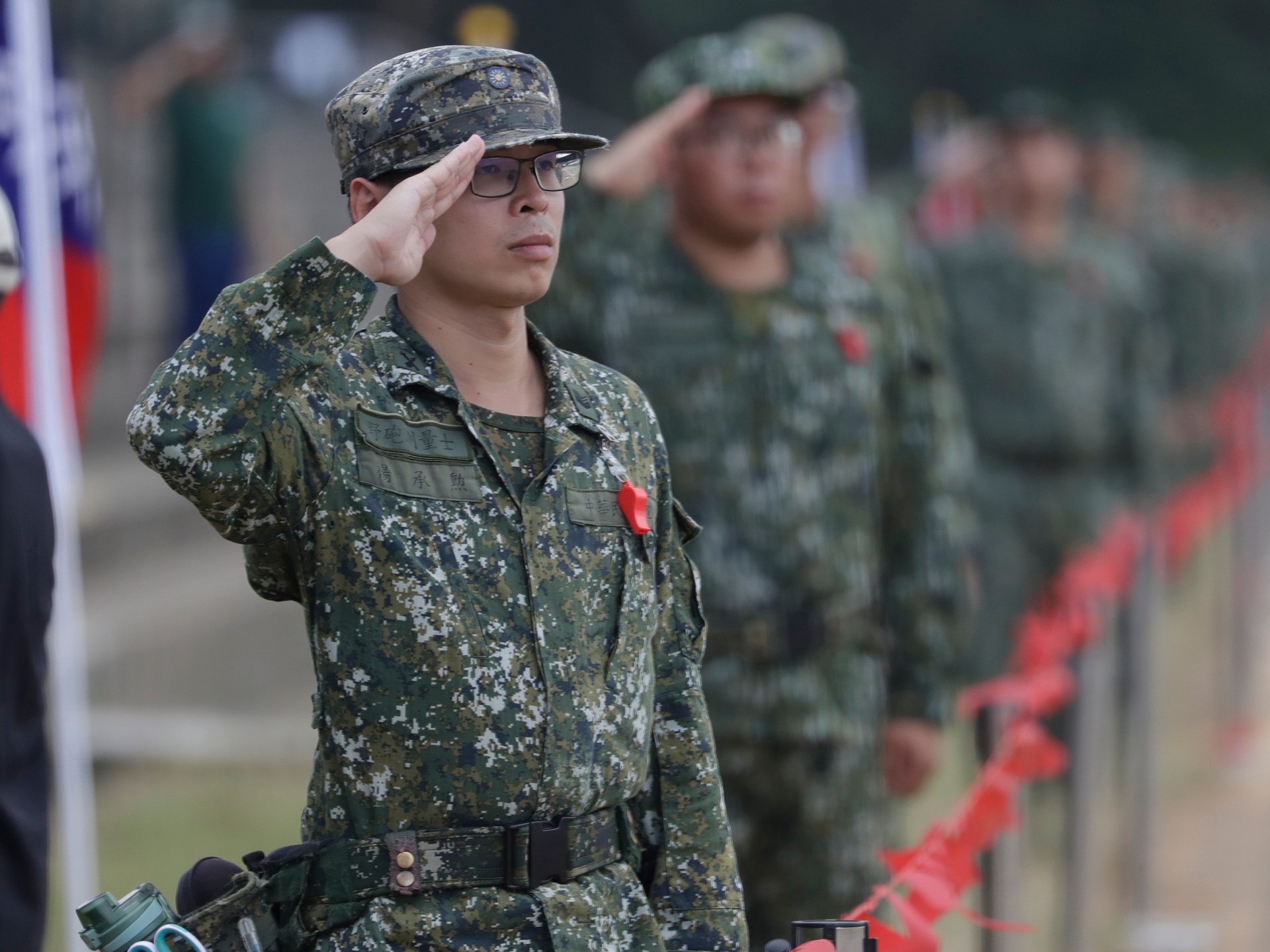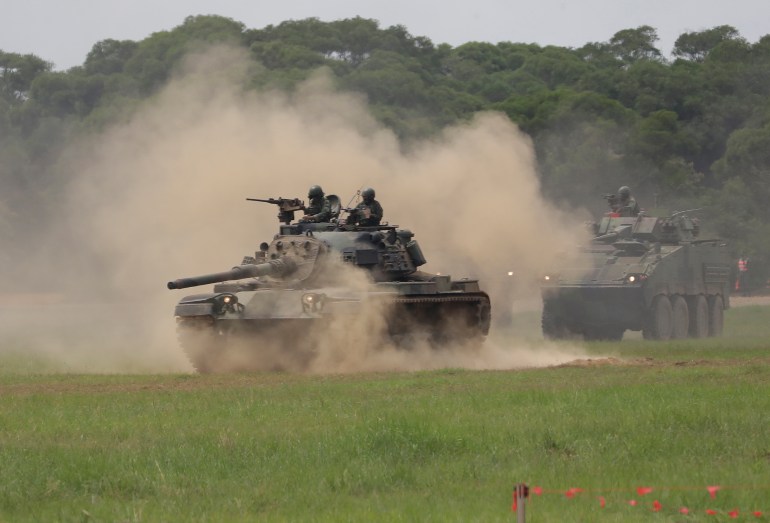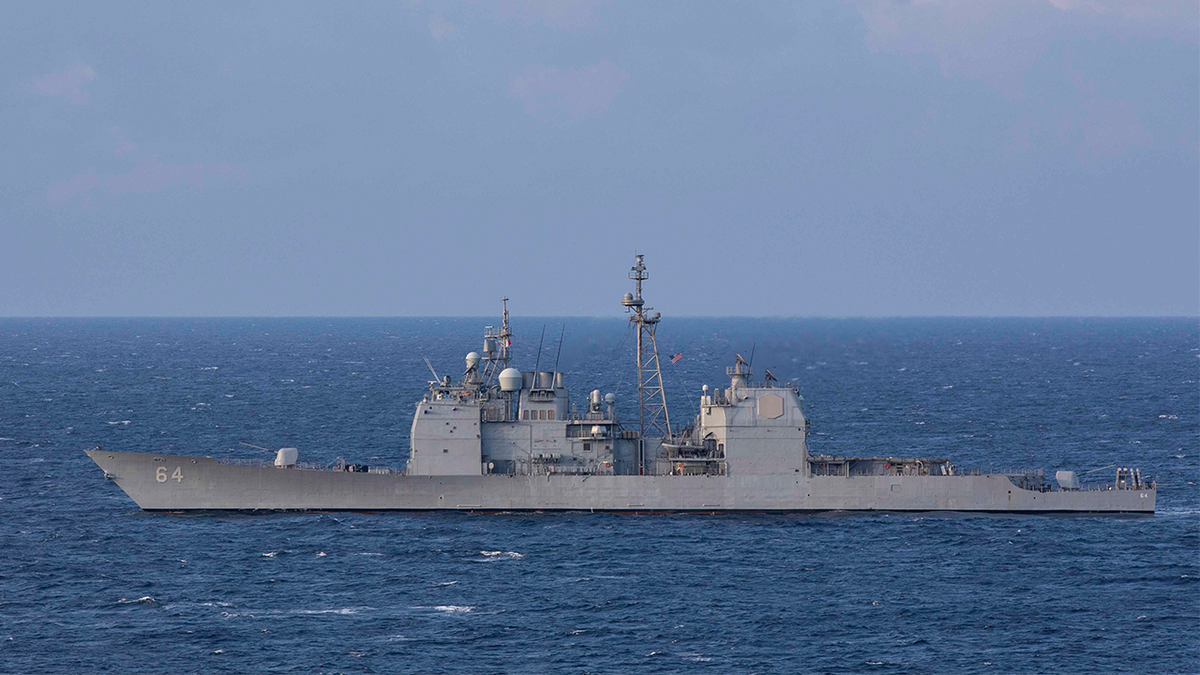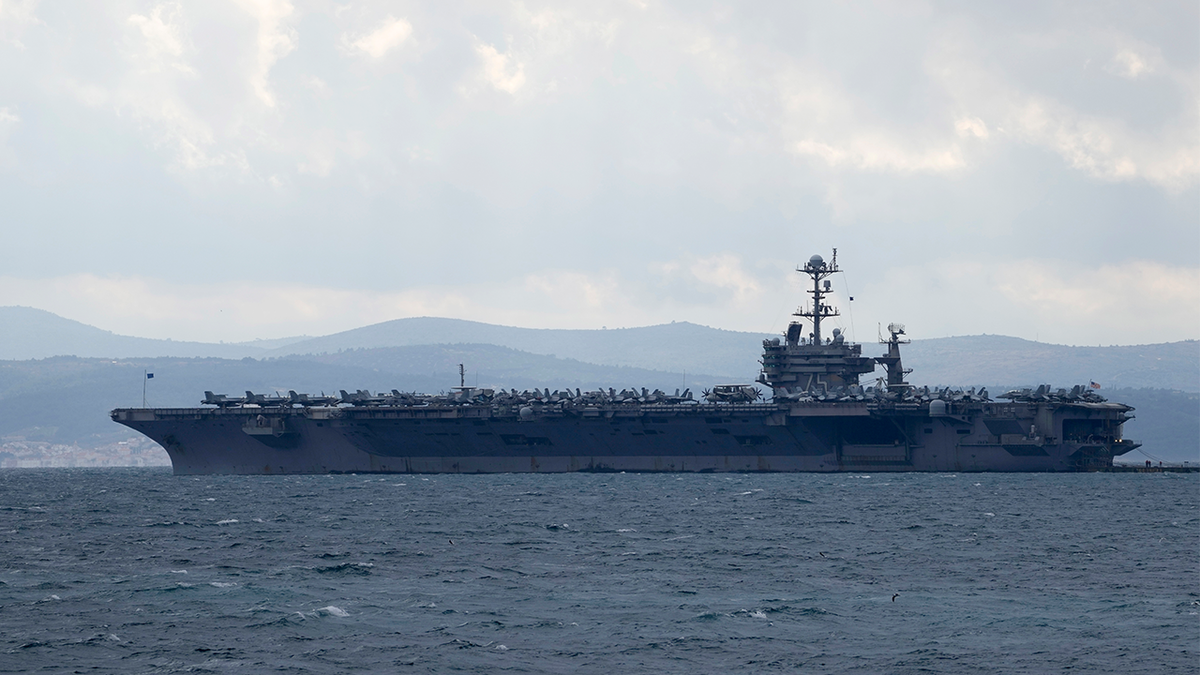World
Taiwan takes security lessons from Hamas, Ukraine surprise attacks

Taichung, Taiwan – On October 7, the Palestinian armed group Hamas launched a surprise attack on Israel, firing thousands of rockets that quickly overwhelmed Israel’s state-of-the-art Iron Dome air defence system while thousands of fighters infiltrated southern Israel by air, sea and land.
The significance of Hamas’s surprise attack was not lost on Taiwan’s military, which lives with a promise by Beijing’s political leaders to unify self-ruled Taiwan with China, by force if necessary.
In the week after Hamas’s raid on Israel, the Taiwanese defence ministry announced the establishment of a task force to draw lessons from the Israel-Gaza war.
Taiwan’s defence minister, Chiu Kuo-cheng, has said that an initial lesson is that intelligence gathering will be key to counter China’s threats.
Taiwan also has the sea, said 42-year-old Tony Wei, who is a member of the Taiwanese reserves and a dentist by profession.
Taiwan is separated from China’s east coast by a 130-kilometre (81-mile) stretch of ocean known as the Taiwan Strait which acts as a natural barrier and early warning system should Beijing try to overwhelm Taiwan in a surprise attack.
“To invade Taiwan, they (the Chinese military) have to gather a very large fleet,” Wei told Al Jazeera.
China’s mobilisation of such a naval force would probably be detected by Taiwan, giving the self-ruled island time to ready for an invasion or even launch a preemptive attack, Wei said.
Still, the Hamas raid – largely considered unimaginable by military analysts before it happened – has made Wei question whether Taiwan truly possesses the capabilities necessary to counter a potentially determined Chinese military.
“The Israelis have a very powerful military, an effective intelligence service and a lot of American support,” Wei said. “If even Israel can be surprised and overwhelmed, then what about Taiwan?”
The Israel-Gaza war is the second time the world has recently been taken aback by a military operation considered improbable until it was carried out.
“They said that President Putin wouldn’t attack Ukraine, but he did, and they said that Hamas couldn’t attack Israel, but they did,” Wei said, referring to the Russian invasion of February 2022.
“Taiwan needs to learn from these attacks in case our island becomes the next place where the unthinkable happens.”
Surprise attacks: Knowing before, responding after
“Hamas’s attack achieved strategic, operational, and tactical surprise against the Israelis,” Eric Chan, a non-resident research fellow at the Global Taiwan Institute, told Al Jazeera.
“Taiwan has a vested interest in avoiding this type of surprise, especially because their adversary has greater powers than Hamas,” Chan said.
“The Russian invasion, as well as the surprise attack by Hamas, was an object demonstration that while you may think that the adversary is deterred by high costs, the adversary may actually not care,” he added.
Fang-Yu Chen, an assistant professor at Soochow University in Taipei who researches political relations between Taiwan, China and the US, said that Taiwan’s announced establishment of a task force in the aftermath of the Hamas attack was an attempt to learn lessons in order to prevent a Taiwanese intelligence failure with regards to China.
“Taiwan is constantly picking up a lot of information about China’s activities, but such information has to be verified, analysed and passed on to the right people,” Chen told Al Jazeera.
According to Chen, Taiwan might look to strengthening its intelligence gathering in order to ensure that credible threats from China are clearly identified before a potential disaster strikes.
“The next major consideration is what to do after an attack has already taken place,” he said.
Taiwan’s government has taken steps in that direction, too.
More money is being allocated to the military; compulsory military service for Taiwanese citizens is being extended from four months to one year; the purchase of new missile systems was announced, and the island’s first domestically built submarine was also unveiled earlier this month.
In its preparations, Taiwan has also looked to and learned from the war in Ukraine, according to Chen.
A major lesson of Russia’s invasion is the importance of not only strengthening the island’s conventional military and intelligence but also its capabilities within the field of information warfare in order to win the battle of the narrative, he said.
War of narratives
Chen has observed that China’s information operations directed at Taiwan have adjusted since Russia’s invasion of Ukraine.
“Before the Ukraine war, the propaganda was often about how the US will abandon Taiwan, but after the war, it has been about how the US is pushing China towards war,” he said.
At the same time, Chen has detected a polarisation of public opinion in Taiwan with people who were already willing to fight against Chinese aggression becoming more willing to confront Beijing while those who were unwilling to fight have become even less willing.
Amid this battle for public opinion and efforts to influence personal resolve among the Taiwanese, Taiwan’s government last year launched a ministry of digital affairs which has since introduced a range of measures to combat disinformation directed at the island and its population.
In the battle of narratives it is not just a matter of countering disinformation that reaches Taiwan, said Wei, the military reservist, but also about how Taiwan obtains the backing of other countries.
Taiwan’s President Tsai Ing-wen has also taken certain preliminary steps to accomplish this by encouraging the island to tell its own story to the world. Through the “Give Taiwan a Voice” campaign, her administration has protested against Taiwan’s exclusion from the United Nations and sought to highlight the island’s contributions to the international community.
At the same time, Tsai has sought to reach out to and integrate Taiwan more extensively with countries in South and Southeast Asia through a so-called “southbound policy” under the slogan of “Taiwan helps Asia, Asia helps Taiwan”.
Wei believes such initiatives are important if Taiwan is to win over world opinion in the face of increasing pressure from China.

For Wei, the importance of winning the narrative was highlighted in the information battle that broke out between Israel and Hamas over responsibility for the deadly explosion at the al-Ahli Arab Hospital in Gaza.
The fight to convince the world of the magnitude and responsibility for the hospital atrocity had far-reaching consequences as meetings between US President Joe Biden – Israel’s staunchest ally – and several Arab leaders were cancelled amid a global outcry over the attack.
As Wei said, no one supports someone who bombs hospitals, and no one can win a war without assistance from the outside.
Winning the information war, he said, will be crucial for Taiwan in any potential confrontation with China.
“So, we must win the war of words so that we can count on international support if Chinese bombs strike Taiwan.”

World
Small plane crashes into Brazil town popular with tourists, killing 10

Twin-engine plane crashed in largely residential neighborhood of Gramado shortly after takeoff, authorities say.
A small plane has crashed into a tourist hotspot in southern Brazil, killing all 10 people on board and injuring more than a dozen people on the ground, officials have said.
The twin-engine Piper PA-42-1000 hit the chimney of a home and the second floor of a different house before crashing into a shop in a largely residential neighbourhood of Gramado shortly after takeoff from Canela, Brazil’s Civil Defense agency said on Sunday.
Rio Grande do Sul Governor Eduardo Leite told a news conference that the aircraft’s owner and pilot, Luiz Claudio Galeazzi, was killed along with nine members of his family.
Leite said that 17 people on the ground were injured, 12 of whom were still receiving treatment in hospital.
Galeazzi’s company, Galeazzi & Associados, confirmed that its CEO and Galeazzi’s wife and three daughters had died in the crash.
“Luiz Galeazzi will be forever remembered for his dedication to his family and for his remarkable career as a leader of Galeazzi & Associados,” the company said in a post on LinkedIn.
“In this moment of immense pain, Galeazzi & Associados is deeply grateful for the expressions of solidarity and affection received from friends, colleagues and the community. We also sympathize with all those affected by the accident in the region.”
Gramado, located in the Serra Gaucha mountains, is a popular destination for vacationers, especially during the Christmas season.
The crash comes a little more than a year after Brazil suffered its worst air disaster in nearly two decades when a twin-engine plane crashed in the southeastern city of Vinhedo, killing all 62 people on board.
World
Memes, Jokes and Cats: South Koreans Use Parody for Political Protest

As South Koreans took to the streets this month demanding the ousting of their president, some found an unexpected outlet to express their fury: jokes and satire.
They hoisted banners and flags with whimsical messages about cats, sea otters and food. They waved signs joking that President Yoon Suk Yeol’s declaration of martial law had forced them to leave the comfort of their beds. Pictures of the flags spread widely on social media.
The idea was to use humor to build solidarity against Mr. Yoon, who has vowed to fight his impeachment over his ill-fated martial law decree on Dec. 3. Some waved flags for nonexistent groups like the so-called Dumpling Association, a parody of real groups like labor unions, churches or student clubs.
Video by Yu Young Jin/The New York Times
Photos by Weiyi Cai/The New York Times
“I just wanted to show that we were here as part of the people even if we aren’t actually a part of a civic group,” said Kim Sae-rim, 28, who waved the flag of the dumpling group at a recent protest she went to with friends. Some groups referred to other local favorites like pizza and red bean pastries.
Kwon Oh-hyouck, a veteran protester, said that he had first seen such flags emerge during demonstrations in 2016 and 2017 that ultimately resulted in the removal of President Park Geun-hye. Mr. Kwon said that satire was part of the Korean spirit of protest.
“People satirize serious situations, even when those in power come out with guns and knives,” he said. “They are not intimidated.”
In the past month, protesters have come up with a wide range of unorthodox groupings. Some were self-proclaimed homebodies. Still others came together as people who suffered from motion sickness.
Video by Chang W. Lee/The New York Times
Photos by Weiyi Cai/The New York Times
Video by Weiyi Cai/The New York Times
Photo by Chang W. Lee/The New York Times
Lee Kihoon, a professor of modern Korean history at Yonsei University in Seoul, said that he believed the flags at this month’s protests were an expression of the diversity of people galvanized by the president’s attempt to impose military rule.
“They’re trying to say: ‘Even for those of us who have nothing to do with political groups, this situation is unacceptable,’” he said. “‘I’m not a member of a party or anything, but this is outrageous.’”
Some held signs ridiculing Mr. Yoon, saying that he had separated them from their pets at home and disrupted their routine of watching Korean dramas. One group called itself a union of people running behind schedule, referring to the idea that the need to protest over martial law had forced them to reschedule their appointments.
Photo by Weiyi Cai/The New York Times
Photo by Chang W. Lee/The New York Times
And of course, there were animals, both real and fake.
Photos by Weiyi Cai/The New York Times
South Koreans have shown that protests for serious causes — like the ousting of a president — can still have an inviting, optimistic and carnival-like atmosphere.
“I don’t know if the protesters realize it, but even though they’re angry, they haven’t gotten solemn, heavy or moralistic,” Mr. Lee said. “The flags have had an effect of softening and relaxing the tension.”
On the day that lawmakers voted to impeach Mr. Yoon, protesters who were K-pop fans brought lightsticks to rallies and danced to pop songs blasting from speakers. “Even though this is a serious day,” said Lee Jung-min, a 31-year-old fan of the band Big Bang, “we might as well enjoy it and keep spirits up.”
Video by Chang W. Lee/The New York Times
World
Two US Navy pilots shot down over Red Sea in apparent 'friendly fire' incident: US military

Two U.S. Navy pilots were shot down Sunday over the Red Sea in what appeared to be “friendly fire”, the U.S. military said.
The pilots were found alive after they ejected from their aircraft, with one suffering minor injuries.
The incident demonstrates the pervasive dangers in the Red Sea corridor amid ongoing attacks on shipping by the Iranian-backed Houthis, even as U.S. and European military coalitions patrol the area.
The U.S. military had conducted airstrikes targeting Yemen’s Houthi rebels at the time, but U.S. Central Command did not elaborate on what their mission was.
US NAVY SHIPS REPEL ATTACK FROM HOUTHIS IN GULF OF ADEN
A fighter jet maneuvers on the deck of the USS Dwight D. Eisenhower in the Red Sea, June 11, 2024. (AP)
The military said the aircraft shot down was a two-seat F/A-18 Super Hornet fighter jet assigned to the “Red Rippers” of Strike Fighter Squadron 11 out of Naval Air Station Oceana, Virginia.
The F/A-18 shot down had just flown off the deck of the USS Harry S. Truman aircraft carrier, according to Central Command. On Dec. 15, Central Command said the Truman had entered the Mideast, but did not specify that the carrier and its battle group were in the Red Sea.
“The guided missile cruiser USS Gettysburg, which is part of the USS Harry S. Truman Carrier Strike Group, mistakenly fired on and hit the F/A-18,” Central Command said in a statement.
It is unclear how the Gettysburg had mistaked an F/A-18 for an enemy aircraft or missile, particularly since ships in a battle group are linked by radar and radio communication.
US MILITARY CONDUCTS SUCCESSFUL AIRSTRIKES ON HOUTHI REBEL FORCES IN YEMEN

The Ticonderoga-class guided-missile cruiser USS Gettysburg (CG 64) steams in the Mediterranean Sea, Dec. 15, 2024. (AP)
Central Command said that warships and aircraft earlier shot down multiple Houthi drones and an anti-ship cruise missile launched by the rebels. Fire from the Houthis has previously forced sailors to make decisions in seconds.
The U.S., since the Truman arrived, has ramped up its airstrikes targeting the Houthis and their missile fire into the Red Sea and the surrounding area. But an American warship group in the region may lead to additional attacks from the rebels.
On Saturday night and into Sunday, U.S. warplanes conducted airstrikes that shook Yemen’s capital of Sanaa, which the Houthis have held for a decade. Central Command said the strikes targeted a “missile storage facility” and a “command-and-control facility.”
Houthi-controlled media reported strikes in both Sanaa and around the port city of Hodeida, but did not disclose details on any casualties or damage.

Aircraft carrier USS Harry S. Truman is moored near Split, Croatia, Feb. 14, 2022. (AP)
The Houthis later acknowledged the aircraft being shot down in the Red Sea.
Since the start of the Israel-Hamas war in October of last year, the Houthis have targeted about 100 merchant vessels with missiles and drones.
The rebels say that they target ships linked to Israel, the U.S. or the U.K. to force an end to Israel’s war against Hamas in Gaza, which began after Hamas’ surprise attack against Israel on Oct. 7, 2023, although many of the ships the rebels have attacked have little or no connection to the ongoing war, including some headed for Iran.
The Houthis also have increasingly targeted Israel with drones and missiles, leading to retaliatory airstrikes from Israeli forces.
The Associated Press contributed to this report.
-

 Politics1 week ago
Politics1 week agoCanadian premier threatens to cut off energy imports to US if Trump imposes tariff on country
-
/cdn.vox-cdn.com/uploads/chorus_asset/file/25789444/1258459915.jpg)
/cdn.vox-cdn.com/uploads/chorus_asset/file/25789444/1258459915.jpg) Technology1 week ago
Technology1 week agoOpenAI cofounder Ilya Sutskever says the way AI is built is about to change
-

 Politics1 week ago
Politics1 week agoU.S. Supreme Court will decide if oil industry may sue to block California's zero-emissions goal
-
/cdn.vox-cdn.com/uploads/chorus_asset/file/25546252/STK169_Mark_Zuckerburg_CVIRGINIA_D.jpg)
/cdn.vox-cdn.com/uploads/chorus_asset/file/25546252/STK169_Mark_Zuckerburg_CVIRGINIA_D.jpg) Technology1 week ago
Technology1 week agoMeta asks the US government to block OpenAI’s switch to a for-profit
-

 Business1 week ago
Business1 week agoFreddie Freeman's World Series walk-off grand slam baseball sells at auction for $1.56 million
-
/cdn.vox-cdn.com/uploads/chorus_asset/file/23951353/STK043_VRG_Illo_N_Barclay_3_Meta.jpg)
/cdn.vox-cdn.com/uploads/chorus_asset/file/23951353/STK043_VRG_Illo_N_Barclay_3_Meta.jpg) Technology1 week ago
Technology1 week agoMeta’s Instagram boss: who posted something matters more in the AI age
-
News1 week ago
East’s wintry mix could make travel dicey. And yes, that was a tornado in Calif.
-
/cdn.vox-cdn.com/uploads/chorus_asset/file/24924653/236780_Google_AntiTrust_Trial_Custom_Art_CVirginia__0003_1.png)
/cdn.vox-cdn.com/uploads/chorus_asset/file/24924653/236780_Google_AntiTrust_Trial_Custom_Art_CVirginia__0003_1.png) Technology2 days ago
Technology2 days agoGoogle’s counteroffer to the government trying to break it up is unbundling Android apps
















